
























In an industry where cost is often the focus, Active IQ stands apart by delivering more - more quality, more support, more value.
We know that price matters, but when it comes to qualifications, reliability, and long-term success, quality is non-negotiable. That’s why we offer:
Industry-leading qualifications – Designed with employers to meet workforce demands
Comprehensive support – A dedicated team invested in your success
Added value – Free CPD, FitPro membership with eLearning purchases, and extra resources at no cost
A trusted partner – Transparent pricing, no hidden fees, and a gold-standard reputation. Why settle for less? Begin with better. Choose Active IQ.
WHERE YOU GET MORE.... MORE QUALITY, MORE SUPPORT, MORE VALUE.





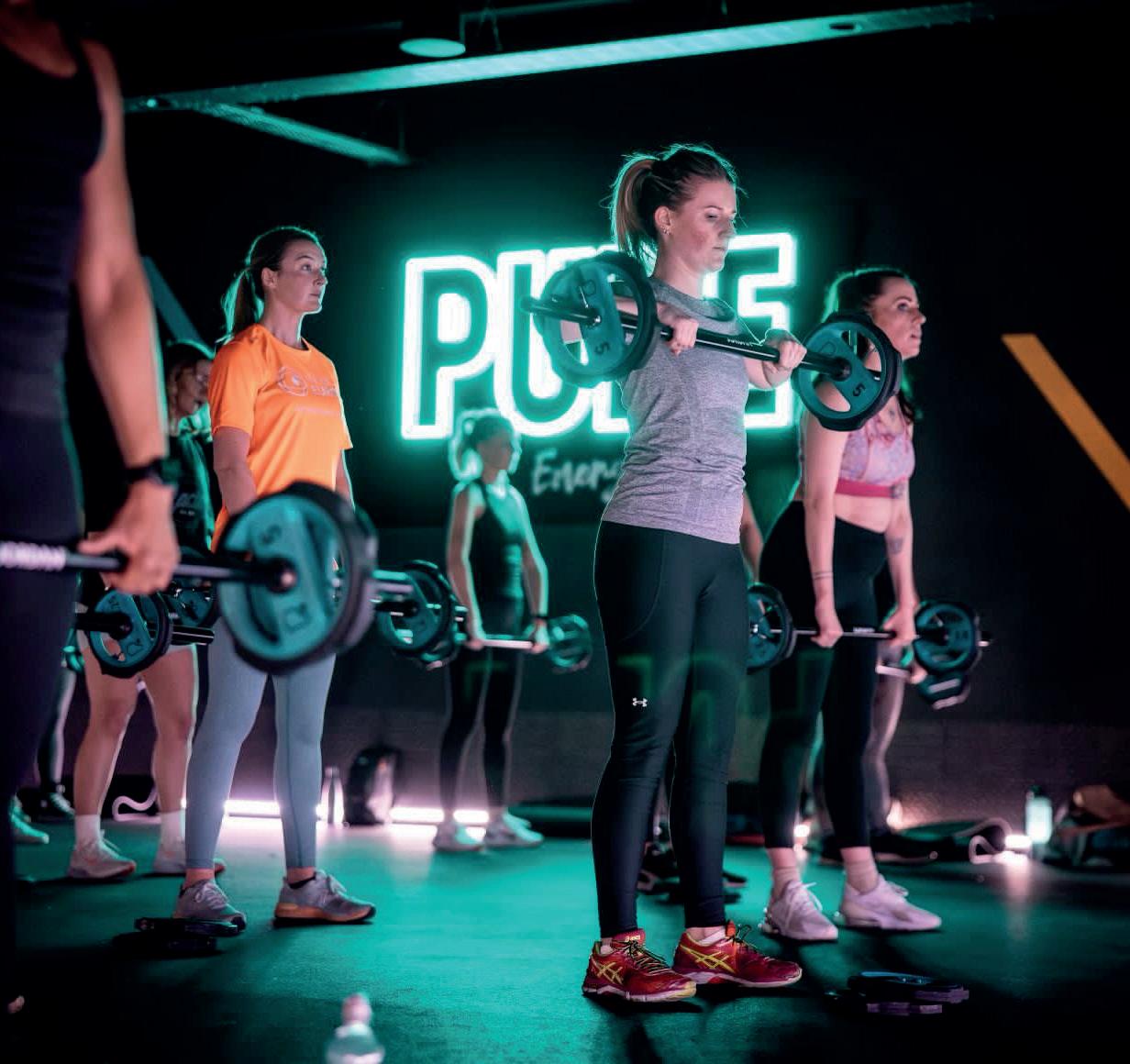
SH1FT will provide classes across the PureGym estate this year
PureGym and SH1FT Fitness have partnered for what they describe as “one of the largest group fitness rollouts in history”.
Eight group fitness formats –developed by SH1FT specifically for PureGym – have been launched across all PureGym locations in the UK. The roll out will see more than 15,000 SH1FT classes being delivered each week nationally.
The programming includes new indoor cycling and holistic classes –genres that are notoriously difficult for instructors with no previous group fitness teaching experience. The new classes are RIDE, a HIIT-based cycling format, and MIND, a holistic offering that introduces a balanced and restorative fitness experience.
To train enough instructors to deliver the classes, SH1FT worked
with PureGym across six weeks in November and December 2024.
During the period, more than 3,900 instructors were trained in the eight group fitness formats across nearly 350 individual live training sessions.
SH1FT founder, Will Brereton, said: “This rollout represents a breakthrough in what’s possible for group fitness.
“Training nearly 4,000 instructors across eight formats in such a short time – and equipping them to deliver classes immediately – is something the industry has never seen before.
“Gyms are no longer forced to choose between the strain of creating internal programming and the high costs of running 3rd-party Group Fitness classes. The future of Group Fitness is simple: quality classes that empower instructors and motivate members – and that’s exactly what we are delivering.”
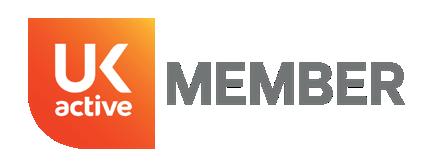






This year’s Active Uprising – held at the QE II conference centre in London –featured a number of keynote speeches and panel discussions and attracted an audience of 500 health experts, physical activity leaders and policymakers.
In his opening conference speech, ukactive Chair, Mike Farrar, said the Government should unlock the potential of a growing physical activity sector to achieve its economic growth ambitions. He urged the government to earmark substantial investment into the sector as the NHS promises to move towards more prevention.
The former CEO of the NHS Confederation’s headline message was that the government needs to fully utilise the opportunities presented by the physical activity sector.
“As it reaches for quick wins, our government has a great opportunity to stand fore square in support

of the industry that sits behind a healthier nation – the physical activity industry,” Farrar said.
“I know that the Government can achieve growth through health – a nation that is more physically active will be more economically active. Any growth plans will need to focus on immediate growth as well as longterm strategy such as plans for airport runways.”
The theme for ukactive’s flagship annual conference was ‘No Growth without Health: Physical Activity’s Role in National Renewal’, attracting speakers and delegates from across the worlds of government, healthcare, fitness and sport.


The study surveyed more than 1,200 adults aged 60 and above
Older adults would be ready to engage more with exercise, but often lack the right encouragement, communication and access to safe spaces. A new study by Manchester Metropolitan University – conducted on behalf of power assisted exercise equipment specialist, Innerva – questions the notion that barriers such as cost, physical limitations and fear of injury heavily influence decision-making. Instead, social factors and personal beliefs about the benefits are far greater drivers of motivation to exercise. This means that the perceived barriers to exercise are far less significant than fitness, sport and physical activity operators assume.
More than 1,200 adults aged 60 and above were involved in the study, which explored the main barriers and motivations for older adults in undertaking power-assisted exercise.
The cohort included both exercisers and non-exercisers as well as users and non-users of power-assisted exercise. The research was part-funded by a grant
from Innovate UK as part of the UKRI Healthy Ageing Challenge – Designed for Ageing, which aimed to harness the best of UK design talent and inclusive user engagement to develop solutions that helped people thrive in later life.
Professor Paul Smith, who led the research project, described the findings as “surprising”.
“We asked 28 questions about barriers to exercise and discovered that no single barrier stood out as a major obstacle,” he said.
“Older adults are more influenced by social factors and personal beliefs about the benefits of exercise, principally whether they believe the exercise is beneficial for their health, is an opportunity to socialise and are encouraged by what other people think of it.
“These factors have a far greater impact on their intentions than barriers.
“The older adult market is ready to engage once they are made aware of the exercise options available.”

Future Fit for Business has launched an online course for fitness and wellness professionals looking to gain insights into the use of GLP-1 in weight management programmes. Called Navigating GLP-1 for Sport and Physical Activity Professionals, the course has been tailored specifically for the fitness and wellness industry.
As obesity, diabetes and weight management challenges continue to rise globally, the course aims to ensure personal trainers and fitness staff can tailor training, nutrition and support to meet their clients’ evolving needs.
The GLP-1 course is structured to meet the diverse needs of learners through three sections.
The first focuses on the basics, addressing foundational questions about GLP-1 medications, including what they are, their benefits and potential risks.
The second explores the science behind these medications, uncovering the mechanisms that explain their effects. For those seeking practical application, the third section offers real-world strategies and case studies, providing actionable guidance for working with individuals using GLP-1 medication.
Elaine Briggs, Chief Education and Partnership Officer at Future Fit, said: “Our GLP-1 course reflects our commitment to equipping professionals with the knowledge to meet today’s healthcare challenges with confidence”.

The Padel Club appoints Gym Group founder, John Treharne, as chair
Padel operator, The Padel Club, has appointed fitness industry veteran John Treharne as Chair.
Treharne launched The Gym Group in 2007 and is considered among the key pioneers of the UK’s low-cost gym sector. Under his leadership, The Gym Group became the first UK health and fitness group to list on the London Stock Exchange in more than 15 years. The Gym Group currently has 245 gyms nationwide and more than 891,000
ukactive Chair Mike Farrar to step down
Mike Farrar is stepping down as Chair of ukactive after being appointed interim Permanent Secretary of the Department of Health in Northern Ireland. Farrar will be taking up his new role in April 2025, following his final appearance as ukactive Chair at Active Uprising 2025 on 6 March.
He was named ukactive Chair in June 2022, taking over the role from Baroness Tanni Grey-Thompson. During his tenure, he has been credited with helping to grow the sector’s relationship with the NHS and care services, including the co-design of a new blueprint for integrated care systems.
Farrar’s new role will see him replacing the current Permanent Secretary, Peter May, who is retiring from the Northern Ireland Civil Service.
The recruitment of a new ukactive Chair will be overseen by ukactive’s Treasurer, Katy Cox, who will also act as interim Chair until Farrar’s successor is appointed.
Farrar said: “It has been a privilege to be Chair of ukactive and play a part in shaping the future of this fantastic organisation and sector.

I wish to thank my colleagues, our partners and all ukactive’s members for supporting this important period in our journey and strategy for growth.
“I am confident that I will leave the Board, the organisation and the sector in a strong position to continue our growth and realise our vision for physical activity in the UK.”
Huw Edwards, CEO of ukactive, said: “Mike has been a tremendous ally for the organisation and the sector, instrumental in driving forward the work to integrate the physical activity sector with the health and care sector.”
members (at the end of 2024).
Treharne brings more than 30 years of expertise in the leisure and fitness industry and is a former England squash player.
Launched in 2022, The Padel Club secured £1.5 million investment in 2024 from the Northern Powerhouse Investment Fund II (NPIF II), facilitated by Praetura Equity Finance, as part of a £3.8 million funding round –the largest in UK padel history.

Inspace Fitness appoints Fiona Cresswell
Fitness equipment specialist, Inspace Fitness, has appointed Fiona Cresswell as its new national head of sales. Cresswell has extensive experience in the fitness industry, having worked with some of the UK’s largest brands – including Matrix, Life Fitness, Les Mills and Anytime Fitness – in a variety of growth roles. Inspace Fitness provides gyms and fitness operators with turnkey solutions for fitness spaces and was founded five years ago by Phill Griffin and Ben Steadman.





Revised proposals have been submitted for a leisure centre development in Croydon, South London.
An initial planning application for the Purley Pool project was submitted to Croydon Council in 2024. Proposals included a leisure centre, a later living housing scheme, shops and a new public square.
Following a series of public exhibitions and workshops by Polaska, the long-term leaseholder and developer of the site – and in response to comments received during the planning application’s public consultation – a revised plan has now been submitted to the council.
Under the new plans, the leisure centre has been redesigned to accommodate a 25m, six-lane main pool, a training pool and a larger space for the gym and fitness studio than previously planned. The layout has also changed so the café directly overlooks a new dedicated soft play space so parents can easily supervise their children.

As part of the later living scheme, a total of 10% of homes are proposed to be affordable, to better support the housing needs of the borough.
The proposal also includes a new public car park, with some parking reserved for users of the later living facility.
Feedback has been received from local residents calling for more public parking. While the Greater London Authority (GLA), which needs to give consent, has encouraged a car-free development, the revised proposals would increase the number of parking spaces available to the public.
Tor Sports and Leisure facility in Glastonbury reopened in February following a £2.2 million refurbishment. The works on the centre included the creation of a new gym space, a changing place facility and improved access around the centre, as well as a refurbished bar area.
Sustainability has been a key focus throughout the project, helping Glastonbury become a zero-carbon town. New energy-efficient measures have been installed including extra insulation added to the roof.
Somerset Council, which owns the centre, appointed Pick Everard as project manager and quantity surveyor for the redevelopment works. Operating through Perfect Circle and accelerated under the SCAPE Consultancy framework, Pick Everard worked alongside construction contractors Rigg Construction (Southern).


According to Leisure DB data, gym membership is higher than ever, with one in four now saying that health and wellbeing is their number one concern. With 80% of gym members visiting the gym at least twice a week, this poses a huge opportunity to engage each customer with additional sales opportunities
When at the gym, 71% claim to buy food and drink, and energy drinks are a key choice when there. In fact, energy drinks are the #2 most bought product at gyms, behind water. Find out more about why functional products are key to increased sales revenue for gyms.
Functional sells
Increasingly, consumers are looking for products with added benefits to help them maintain a healthy, active lifestyle. So, it’s no surprise that ‘functional products’ are a fast-growing category, now worth £4bn, with sales up 23% in the last 12 months.
Despite the emergence of other functional beverages and supplements, sports and energy drinks continue to drive 63% of functional growth, so it is the most important category to get right.

Delivering both a physical and mental boost, energy drinks provide essential fuel for many throughout their workout journey.
However, with most energy drink sales taking place before gym-goers step foot in their local workout venue, either as part of the weekly shop or on their way, this presents a huge opportunity to generate sales and drive incremental revenue during their visit.
Giving members a boost
Granted, this isn’t news, and many gyms already provide a range of energy products on-site. However, current gym ranges are not meeting consumer demand, and many venues devote too much space to less profitable brands. As the number 1
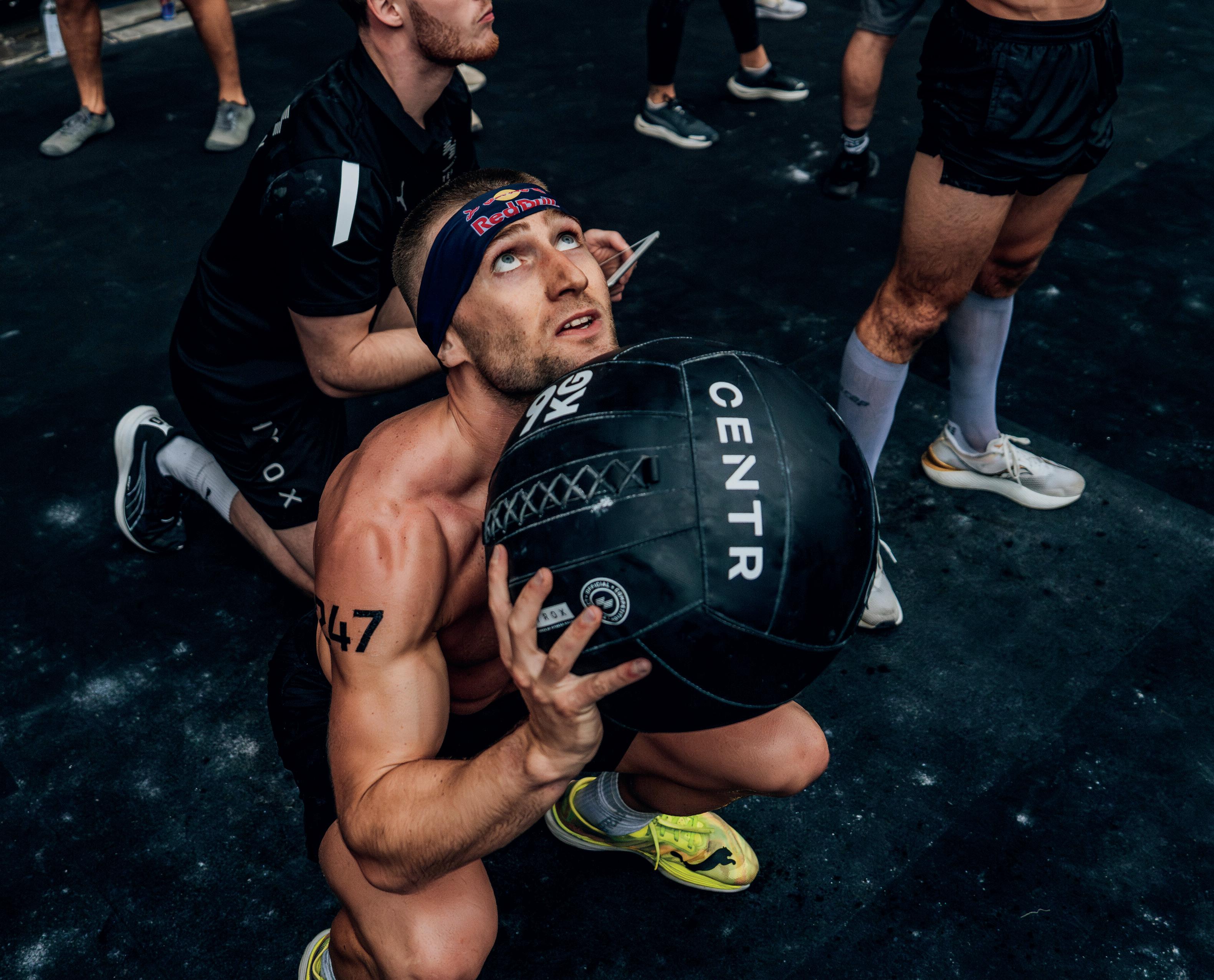
Functional products are a fast-growing category, now worth £4bn, with sales up +23% in the last 12 months
energy drink, Red Bull holds double the market share of the combined brands stocked in this space, so dedicating more of the chiller to recognisable brands, will help drive additional sales. Red Bull is the first brand consumers think of when it comes to energy, as well as being the most relevant and often used caffeinated brand for sports and fitness, so people expect to be able to find it.
The perfect serve
Getting the caffeine level right for exercise, is key, with 88% of gym-goers stating that caffeine content is important to them and the majority (58%) wanting under 100mg for fitness. with
many ‘fitness’ Energy Drinks containing almost double this amount, brands that offer under 100mg are more appealing to gym-goers.
For more information about Red Bull and driving Energy sales in your venue, please contact gympartners.smb@redbull.com
Planning approval has been granted for a new leisure centre in Millom, Cumbria.
Cumberland Council approved the plans for the centre, which is one of four projects that make up the Millom Town Deal. The Town Deal has secured £20.6m from the government’s Town’s Fund –alongside a further £8.7m in match funding – for regeneration projects.
The new activity and leisure facility, also known as Activating Community Health, will house a 25m swimming pool, sports hall and a health club with a large gym floor and fitness studios.
Leader of Cumberland Council, Cllr Mark Fryer said: “The new centre will offer a good mix of physical activities for all ages. It will also provide dedicated space for health services and support residents accessing essential wellness services locally, fostering a healthier and more connected community.
“Designed with accessibility in mind, it will be a truly inclusive space.”

The council has also revealed that it has appointed Thomas Armstrong Ltd as contractor to build the facility.
David Savage, the Chair of the Millom Town Deal Board, said: “We have now secured the approvals so that the construction of the longawaited Leisure Complex can begin.
“This means plans can be turned into reality, and this new facility will complement the work we have already started with the refurbishment of the 3G Pitch. This is another significant step forward for the Millom Town Deal projects and means we are starting to observe real progress.”
Construction work is set to begin on a new leisure centre in Kingston upon Thames town centre this spring, after the project secured planning permission from Kingston upon Thames London Borough Council.
The plans will see the construction of a sustainably designed building housing a 25m, eight-lane swimming pool, a training and teaching pool, a health suite, gym, indoor cycling and activity studios, sports hall, squash courts, soft play area and café.
Accessibility and inclusivity are key aspects of the project. The plans include new pedestrian links into the town centre, alongside a range of landscaped public spaces throughout the scheme, as well as a new and improved play area.
Designed by architects Roberts Limbrick, the project is overseen by Alliance Leisure.



Plans to build a new leisure centre in Farnborough have been given the go-ahead by central government.
Rushmoor Borough Council had been awarded £20m of Levelling Up funding for a facility mixing leisure and culture in the town, but the local authority revisited the plans last year when it became clear that because of the council’s financial position and increased costs, it was no longer affordable.
Therefore, the council was unsure whether the funding – which had been secured based on the more comprehensive leisure and cultural hub plans, which included a library –could be used towards the scheme.
However, following representations led by Alex Baker, Aldershot and Farnborough’s Member of Parliament, ministers have now given permission for the remaining funds to be used towards delivering the leisure centre.
The Ministry of Housing, Communities and Local Government
has also reviewed the plans and confirmed it is content for the council to progress with drawing up detailed designs for the new building.
The new centre is now set to include a 25-metre, eight-lane swimming pool and learner pool, along with a gym offering more than 100 fitness stations. There will also be three fitness studios and a specially designed ‘wellness hub’ with power-assisted equipment to support people, who are less mobile or active, to take part in low-impact exercise.
The council will now start to draw up detailed designs for the new centre, with a view to submitting a new planning application later this year. Building work would then start in spring 2026, with a scheduled opening of autumn 2027.
Councillor Gareth Williams, Leader of Rushmoor Council, said: “This is a major step forward to delivering the new leisure centre our residents deserve.

Snap fitness is growing rapidly
Snap Fitness, one of the fastestgrowing UK gym franchises, has announced a new partnership with PSLT, a provider of full turn-key solutions covering gym equipment servicing, upholstery, logistics and trade-ins.
PSLT will service and support more than 100 Snap Fitness franchises across the UK, ensuring members enjoy a consistently high standard of equipment and facilities. The partnership is part of Snap Fitness’ ongoing focus on enhancing its member experience, helping to support clubs with servicing their equipment and minimising any potential downtime. Under the agreement, PSLT will provide comprehensive maintenance, repair, re-upholstery and trade-in services for Snap Fitness UK franchisees. This move follows a successful four-year collaboration with a selection of Snap Fitness’ existing sites. By expanding PSLT’s scope of service across the entire Snap Fitness UK network, the partnership aims to deliver prompt and reliable equipment solutions for all clubs, as well as extending the lifespan of their equipment.
Paul Stephenson, Franchise Operations Director at Lift Brands EMEA commented “This partnership will provide great support for our franchisees and club teams. Having high quality and well-maintained equipment in our gyms is hugely important to members.”

Planning permission has been granted for a new leisure centre and theatre in Giffnock, East Renfrewshire. The new complex will replace a 40-year-old leisure centre and is set to house an eight-lane swimming pool, learner pool, a large fitness suite and three fitness studios, as well as a fourcourt games hall. A large theatre space will be complemented by a smaller studio theatre and bar.
Expected to cost £56m, the new facility will be built alongside the existing leisure centre in Giffnock’s Eastwood Park. The old centre will remain open until the new one opens, in order for local residents to still have access to access to leisure facilities during the construction process. Work on the new complex – which will be owned by East Renfrewshire Council – is due to begin later this year, though some preliminary work will be required before then.
The council will continue to engage with key stakeholders ahead of the main building work. The new facilities are expected to open to the public in the second half of 2027 and the existing leisure centre and theatre would then be demolished.
The council said: “This is a significant milestone in our plans to replace facilities which are more than 40 years old and no longer fit for purpose.”

Digital fitness content platform, Funxtion, and fitness tech giant, EGYM, are expanding their partnership to deliver hyper-personalised workouts.
The collaboration combines Funxtion’s in-club FX POD with EGYM’s open ecosystem, integrating personalised and smart workout experiences in gyms.
The EGYM Genius ecosystem – an AI-driven system designed to make gym environments more intelligent and efficient – create hyper-personalised training plans that adapt to users’ goals, fitness levels (BioAge), and available equipment. This means gym-goers can access tailored workouts, receive on-screen guidance, and track their progress through EGYM’s advanced RFID technology.
The two signed their first partnership in April 2023, which saw Funxtion’s content integrated into EGYM’s Trainer and Member Apps.
By focusing on a “better together” approach, Funxtion and EGYM
now plan to collaborate further and work with some of the world’s largest fitness operators, including Fitness First, World Gym, The Gym Group and leading YMCAs.
Philipp Roesch-Schlanderer, CEO, EGYM explains: “Our partnership with Funxtion aligns perfectly with our vision to make the gym experience more connected, efficient and effective. Integrating Funxtion’s content with our Member and Trainer Apps not only unlock more business opportunities for our enterprise customers but also elevate our end-user experience.
“By incorporating Funxtion’s highquality content into our EGYM Genius ecosystem, we are able to offer hyperpersonalised training experiences, incorporating all aspects of the training space, that adapt to each individual. This collaboration strengthens our commitment to optimising technology’s potential, providing clients with the tools they need to deliver unparalleled, person-centred, training environments.”

We are thrilled to announce the launch of our brand-new customer portal, MyHub. This cutting edge platform represents a significant investment in technology, designed with one goal in mind: to make managing gym equipment simpler, smarter and more efficient for gym operators worldwide.

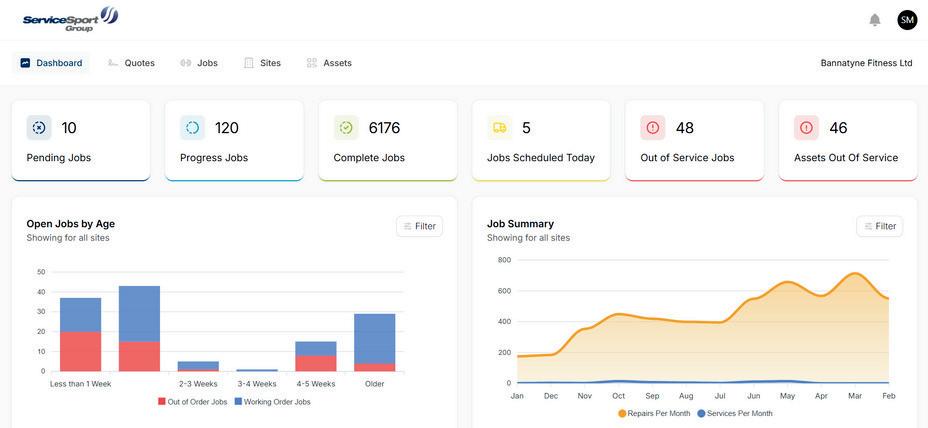










Scan the QR Code today for more information and to request your FREE log-in details. Take back the time it takes to manage the maintenance of your gym equipment! Your members will thank you for it.


The new £30m Halton Leisure Centre in Widnes, Cheshire opened its doors on 10 February.
Construction work on the facility – which is owned by Halton Borough Council and replaces the 40-yearold Kingsway Leisure Centre – has taken two years to complete.
Facilities include a 25-metre swimming pool, learner pool, a large gym, sports hall, fitness studios, squash court, steam room, sauna and large changing rooms – including a Changing Places facility for those with physical and learning disabilities.
A soft play area and cafe will also be opening soon on the ground floor.
Designed by Ellis Williams Architects, the centre was built by a team led by Wates Construction.
Councillor Paul Nolan, Halton Borough Council’s portfolio holder for leisure services, says: “We are thrilled that the new leisure centre is ready to open and are immensely proud of what will be on offer to Halton residents.
“Kingsway served us well for so many years, but this change is long overdue and this fabulous building provides a modern mix of facilities tailored to our local community.
“Keeping active is vital for health and wellbeing, and this project supports the Council’s vision of helping more residents to participate in sport and physical activity for the long-term good.”
David Pierpoint, Operations Director at Wates Construction, said: “Our partnership with Halton Borough Council, which began in 2018, has been a remarkable journey of collaboration. We’re immensely proud to bring this project to life –one that not only fulfils the council’s vision for a sustainability-led leisure centre but also delivers exceptional facilities for the community. Beyond the build, our significant investments in training, education and local businesses reinforce our deep commitment to helping the communities thrive.”

looks to
Plans revealed for a leisure and sports hub in Tonbridge
Details have been revealed for a new leisure hub in Tonbridge, Kent. Set to be built at a central location close to the existing Angel Centre, the hub will form part of Tonbridge and Malling Borough Council’s larger plans to regenerate the town.
The announcement coincides with the launch of a survey to give residents and businesses a chance to share their priorities for redevelopment of the area.
“Locating the replacement Angel centre within the development area paves the way for a masterplan for the whole site, allocating uses to specific locations,” the council said in a statement.
“Options include new homes, shops, a pedestrian area or town square, medical services and improved access routes, including making better use of the nearby riverside.”
A specific location for the new leisure centre will be recommended as part of the initial masterplanning process with a decision by councillors on adoption of the proposal due by June 2025.
The existing site is largely given over to council-owned car parks and is home to the Sainsbury’s store, petrol station and existing Angel Centre, which councillors have agreed in principle to replace with a modern, more energy efficient facility.


Those on a GP referral programme showed improved scores for happiness
People participating in GP exercise referrals have shown a significant increase in life satisfaction.
A study carried out across Greater Manchester – commissioned by GM Active – surveyed 1,700 people either on a waiting list for a GP referral or taking part in a programme.
Using a scale of 1 to 10 to report their life satisfaction, the study showed that the mean scores for patients taking part in referrals were 1.9 points better than for those on a waiting list.
By comparison, previous studies of changes in life satisfaction have found that moving from unemployment to finding work leads to an average 0.5 point increase.
Those on a GP referral programme also showed significantly improved scores for happiness, anxiety, loneliness and feeling worthwhile.
The survey was conducted by State of Life, which has pioneered the creation of “Wellby” scores for organisations such as Sport England,
parkrun, Youth Sport Trust and Ofcom. State of Life founder, Will Watt, said: “These results are what we call first findings and although there is similar work going on elsewhere, they’re significant.
“We’ve also carried out what’s known as regression analysis. This means we’ve taken into account factors such as age, health, disability, socioeconomics, and employment status to give us more confidence that any positive difference we see in the scores is actually due to participation and not anything else.”
A repeat data collection has now been completed and the findings will be broken down borough by borough and fed back to GM Active, whose strategy is focused on addressing physical inactivity and improving population health and wellbeing throughout Greater Manchester.
Andy King, GM Active Chair, said: “The early results are really encouraging as they help demonstrate the positive impact the referral schemes are having.”
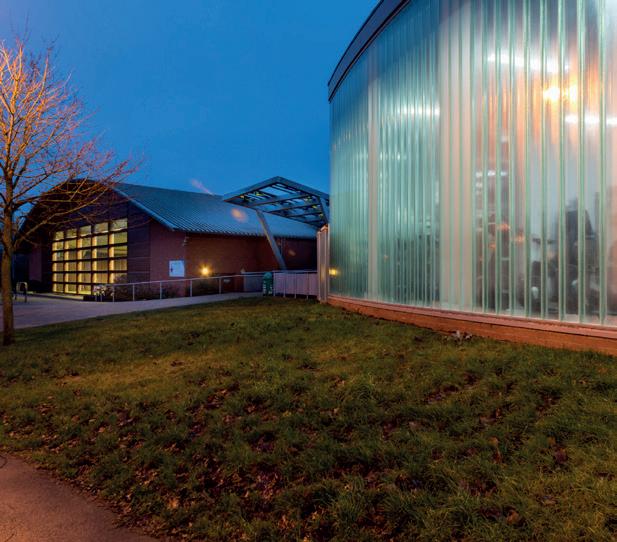
The centres will be sustainable
Work has begun on a £6m project to make two leisure centres in Oxfordshire more environmentally sustainable – and cut energy costs in the process. The first one to benefit from the project is The White Horse Leisure Centre in Abingdon, where work is now underway on replacing the centre’s old gas boilers with airsource heat pumps. The pumps will be powered by 600 new solar panels being added to the roof. Similar works will then be undertaken at the Wantage Leisure Centre later this year.
Vale of White Horse District Council (VWHDC) – which owns the centres – says the developments will provide a huge reduction in both energy costs and carbon emissions.
VWHDC has calculated that its overall carbon emissions will be reduced by more than 25 per cent, which will help it reach its target to become carbon neutral in its own operations by 2030. The works are expected to be completed by March 2026. Both centres are operated on behalf of the council by GLL.
The new energy efficient measures have been made possible by the government’s Public Sector Decarbonisation Scheme (PSDS), run by the Department for Energy Security and Net Zero and delivered by Salix.
The scheme has given VWHDC nearly £6m towards upgrading the centres.
Last year marked a transformative year for SH1FT, securing major Group Fitness partnerships with PureGym and 24 Hour Fitness, cementing its status as a trusted B2B provider and demonstrating its ability to seamlessly integrate within large-scale gym operations. With a relentless focus on innovation, SH1FT is setting new industry standards for Group Fitness— and 2025 looks set to be its biggest year yet.
From bold vision to industry transformation Behind this success lies a story of industry disruption. When Will Brereton watched instructors spending countless unpaid hours on pre-class prep, while their pay stagnated, he saw more than a problem – he saw an opportunity to revolutionise an industry. Drawing on his experience working at fitness giants Les Mills and Beachbody, he created SH1FT in 2017 with a clear vision: harness technology to slash instructor costs by 80% and preparation time by 90%.


SH1FT gained momentum when Samantha Brereton joined her brother as co-founder, combining Will’s fitness industry expertise with her business and marketing acumen. The New Zealand-born siblings’ complementary strengths built a strong leadership team, ready to take the company global.
Pioneering, next-generation group fitness solutions
SH1FT challenged the status quo of ‘memorising pre-choreographed routines’ by pioneering an appbased approach to teaching. This breakthrough empowered instructors of all experience levels to deliver consistently high-quality classes while dramatically reducing their preparation time.
SH1FT’s laser focus on creating cost-effective, scalable solutions for instructors led them to develop six distinct group fitness formats, all built with the same efficiency-centred approach. This proven approach to streamlining instructor experiences perfectly positioned them to help gyms transform their member offerings.
Their model for gyms was simple yet impactful: they created a fully white-labelled solution that the gym could own and leveraged their instructor technology to offer unprecedented flexibility at a fraction of traditional costs.

Gym partnerships in action
Following extensive pilot programmes, SH1FT successfully launched its innovative model across 24 Hour Fitness and PureGym in 2024. These strategic partnerships have positioned SH1FT as an industry leader, proving that a flexible, techdriven approach to group fitness is the future.
24 hour fitness partnership: delivering innovation in longevity training
SH1FT developed two bespoke programs focused on healthspan and longevity, delivering a science-backed, branded experience across their live and digital network. Free from pre-formatted constraints, these programs exemplify SH1FT’s ability to create custom, high-impact solutions that remain cost-effective.
PureGym partnership: record-breaking scale
SH1FT’s partnership with PureGym showcased unprecedented efficiency in scaling group fitness. After developing eight PureGym-branded formats and custom training programs, 3,900 instructors completed their training in just six weeks. The following month, January 2025, saw the nationwide launch of 15,000+ weekly classes. The partnership is designed to grow with PureGym’s international expansion.
Hugh Hanley, Group Director of Personal Training at PureGym, said: “SH1FT’s approach ensures every trainer, regardless of experience, can confidently lead classes. This has been instrumental in achieving a consistent and high-quality experience for our members while optimising our instructor resources.
“To create these eight programmes in-house would have required a much higher budget and taken significantly longer. With SH1FT, we have delivered a high-quality, PureGym-owned group fitness timetable faster and better than we ever thought possible.”
With momentum at an all-time high, SH1FT is preparing for its biggest year yet. A major new initiative launching in 2025 will further empower instructors and strengthen gym partnerships, reinforcing SH1FT’s role as a trailblazing B2B Group Fitness provider.
SH1FT’s journey from bold startup to global industry leader is a testament to innovation, adaptability, and a relentless commitment to instructors. As gyms push to deliver unparalleled member experiences, SH1FT stands ready to provide the tools and expertise that will shape the next era of group fitness.
● Find out more: www.sh1ftfitness.net
Two leisure centres owned by Rushcliffe Borough Council are being redeveloped with the view of both improving their facilities as well as making them more energy efficient.
Cotgrave Leisure Centre and Keyworth Leisure Centre will share an investment of £5.2m, funded in part by the DCMS Swimming Pool Support Fund, the UK Shared Prosperity Fund and the Public Sector Decarbonisation Scheme.
First in line for the improvements has been Cotgrave, where all fitness spaces have been upgraded and a dedicated indoor cycling studio added. Other works included the installation of a Changing Places facility, a revamped reception area with widened corridors and improved layouts and modernised poolside changing rooms to enhance comfort for swimmers.
The funding has also enabled the replacement of Cotgrave Leisure Centre’s outdated heating and hot water systems with new modern, low carbon air source heat pumps.

Cotgrave Leisure Centre and Keyworth Leisure Centre will share the investment
The pumps will use electricity from renewable sources to efficiently draw heat from the air and transfer it into the swimming pool and surrounding areas, resulting in a 250% to 300% increase in energy efficiency. In addition, solar panels installed on the roof will generate up to 55,000KWH of electricity a year,
saving up to £25,000 on running costs – the equivalent of running power for 20 houses. Works on the second project at Keyworth Leisure Centre are set to begin in Summer 2025. The centres are operated by LEX Leisure, a subcontractor of Parkwood Leisure.
BH Live and Mytime Active have become the latest leisure facility operators to have achieved ukactive’s Active Standard. BH Live Active is a registered charity that operates leisure and sports centres across Dorset, Hampshire and London. Mytime Active is an independent charity and social enterprise that operates leisure facilities across the country.
The Active Standard is an industry certification that enables fitness and leisure operators to demonstrate to their partners, stakeholders and customers the safety, inclusivity and quality of their facilities and services.
The standard was designed by industry body, ukactive, with support from leading standards professionals and organisations across the UK and Europe.








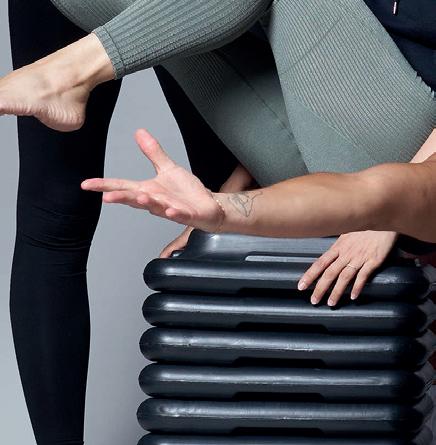


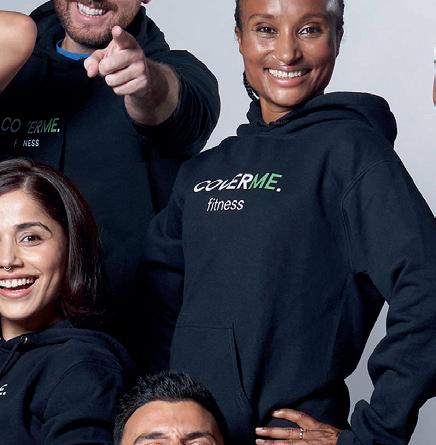












The project will take place in Essex
Sport for Confidence (SfC) has secured funding to deliver a workforce development programme to help people in Essex live healthy lives.
The investment, secured through Essex County Council’s Public Health Accelerator Bid (PHAB), will enable SfC to deliver the Essex Learning Arena (ELA), designed to support frontline professionals across various sectors to embed goal-oriented physical activity into their everyday practice.
It is hoped that the initiative will enhance the quality of life for individuals living with long-term health conditions and disabilities.
The ELA builds on the success of the Essex Prevention and Enablement Model (EPEM), a twoyear pilot focused on improving health outcomes through physical activity. It demonstrated the necessity and effectiveness of a whole-system, preventative approach to utilising physical activity for health improvements.
An independent evaluation by University of Essex suggested that every £1 invested in EPEM could generate £58.72 in social value.
The evaluation concluded that the return could be even greater, if knowledge, skills and capacity were extended across the Essex workforce – a gap the ELA is designed to fill.

Diss Swim Centre has reopened following a £4m refurbishment and improvement programme that took 11 months to complete.
Upgrades at the facility include improvements in the pool area, including the re-profiling of the main pool tank to enhance programming, re-rendering and tiling, modernising the pool plant to enhance water quality and improving accessibility.
The changing areas have been expanded into a larger, more accessible “changing village” with a new viewing area integrated to improve visibility for parents. Updates to the entrance lobby and reception area also deliver a more welcoming environment.
South Norfolk Council, which owns the centre, secured £1.2 million from the government’s Public Sector Decarbonisation Scheme, which supports public bodies to reduce carbon emissions.
These works were delivered directly by the council and included upgrades
to the building fabric via cladding and insulation, the removal of the old gas boilers and the installation of three air source heat pumps, with solar panels added to the roof.
The works were delivered by Alliance Leisure, in partnership with Saunders Boston Architects, Real Consulting, DDi Projects and KGO Electrical and Woodwards Mechanical.
Hydrospec was the Council’s preferred supplier for the swimming pool works, which included tank reprofiling and a plant room upgrade.
“Diss Swim Centre has been a cornerstone of the local community for over 50 years, originally as an outdoor lido,” said Steven Peet, Leisure Strategic Development Manager at South Norfolk Council.
“Diss Swim Centre is used by 22 different schools and has footfall of over 150,000 a year. We are delighted to help provide crucial public water space to help people learn to swim, which is a vital life skill. “

























Huw Edwards CEO ukactive
Physical activity is a crucial pillar of our public health, benefiting both individuals and society. However, despite growing awareness of its advantages, too many people in the UK remain inactive, contributing to rising levels of obesity, musculoskeletal problems, cardiovascular disease, and mental health issues.
As policymakers, Members of Parliament (MPs) have a unique opportunity to lead by example, demonstrating the importance of regular exercise and promoting its benefits at a national level. By engaging more in physical activity themselves, MPs can enhance their personal health, improve their effectiveness in public office, and reinforce government initiatives aimed at increasing national participation in exercise.
That’s why ukactive is delighted to be partnering again with Myzone for our third year bringing our campaign ‘Fit for Office’ to the UK Parliament. For the duration of March, ukactive and Myzone will be provide activity tracking devices to all participating MPs, Peers, and their staff, and encourage all entrants to compete to see who can be crowned Westminster’s Physical Activity Champion 2025. This challenge is an opportunity for some friendly competition between parliamentarians, but also to highlight the impact of incorporating activity into the working day for our health, happiness, and productivity. That last point is crucial, as we want to drive forward three key outcomes from this year’s Fit for Office challenge.
We want to shine a light on the health and wellbeing of our policymakers themselves. Parliamentary duties are demanding, often involving long hours, high stress, and sedentary work. Regular physical activity can improve parliamentarians’ overall health, boosting their energy levels and cognitive function.
Exercise has been shown to enhance mental clarity, reduce stress, and improve mood – critical factors in the decision-making process. A healthier and more resilient Parliament can function more effectively, with MPs better equipped to tackle the country’s pressing challenges.

Encouraging MPs to engage in exercise isn’t just beneficial for their health; it has broader implications for public policy
Furthermore, we want Parliament to set the tone for workplace culture in the UK. If MPs prioritise exercise and advocate for workplace wellness programmes, businesses and other workplaces can follow suit. Encouraging physical activity within Parliament –through initiatives such as in-house fitness facilities, sports teams, or structured exercise breaks – can create a ripple effect, encouraging workplaces across the country to adopt similar practices.
We want the MPs involved to utilise the breadth of programmes and services in their own constituencies, and visit gyms, pools, leisure centres, local sports clubs, schools and other recreational clubs during the campaign. In doing so, they can see firsthand how important sport and physical activity is to the fabric of the communities they serve and represent, playing an integral role in helping the physical, mental and social wellbeing of their constituents. We want Fit for Office to deepen the links between MPs and these services, and for them to become their champions back in Westminster.
Encouraging MPs to engage in regular exercise is not just beneficial for their personal health; it has broader implications for public policy and national wellbeing. By leading by example, promoting public fitness initiatives, and shaping policies that support exercise, MPs can play a pivotal role in creating a healthier, more active society. A government that actively embraces the benefits of physical activity is more likely to inspire the nation to do the same, ultimately reducing healthcare burdens and improving the quality of life for all citizens.










In less than two years, CoverMe Fitness has become a critical tool for both clubs and ��tness professionals, streamlining operations, enhancing communication and creating new opportunities for professionals worldwide
Designed to simplify and revolutionise fitness team management, the CoverMe fitness app has quickly gained traction in the fitness industry since its UK launch in 2023. The platform, which started as a group exercise cover solution, has evolved into a comprehensive team management tool, meeting the needs of operators and sport and fitness professionals alike.
“People are the fitness industry’s greatest asset, but until now, this area of club management has not benefitted from advances in technology. As experienced club operators, we understand the cost of ineffective team management, from the hours wasted sourcing cover and the frustration of recruiting new talent, to managing certification and insurance for all members of staff. We knew there had to be a more effective way to manage our teams,” says co-founder Rosanna Tucker.
Tucker and her co-founder Beverlee Brinkworth set out to create a tool that would reduce stress, save time and improve operational efficiency. Enter CoverMe Fitness.


adoption
Within 18 months of its official launch, CoverMe has been adopted by 3.600 clubs globally, including Virgin Active, Fitness First, Serco and Lift Brands. The app has an 100% retention rate and a 97% class cover success record, testament to its success in supporting the fitness industry’s operational needs.
With more than 10,500 fitness professionals active on the app already, CoverMe is on track to enable 3,420 gig opportunities every day in group exercise this year. By 2026 the app will be handling 10,000 opportunities daily – 3.6 million each year - in fitness alone.
CoverMe is expanding internationally. It launched in Australia in January 2024 followed by North America in summer 2024 after forming a strategic partnership with the IDEA® Health & Fitness Association.
Since its launch, the app has evolved into a full-service team management platform. Integrated with leading software solutions including Mindbody, Exerp, Mariana Tek and more, it provides a seamless connection between fitness professionals – from personal trainers and yoga teachers to group fitness instructors and swim coaches – and the venues where they work.

The app helps professionals build their profiles, manage their schedules and find work. It also streamlines communication with clubs, tracks qualifications and simplifies the process of managing compliance and certification. Clubs can oversee their teams more effectively, from managing in-house training to posting audition requests to recruit new talent. The in-app recognition and reward system enhances retention, allowing fitness professionals to earn points and badges to unlock career-enhancing discounts and offers from well-known partner brands including CIMSPA, FitPro and Myzone.
CoverMe has now partnered with jobs platform LeisureJobs to provide a faster, smarter way for fitness operators to build their teams, secure in the knowledge that their new recruits meet the highest standards of professionalism. In an initial pilot, the two organisations are recruiting for highly sought after personal trainer and group exercise instructor roles for Fitness First, one of the UK’s most recognised fitness brands.
“CoverMe is the future of work. It’s the infrastructure that invites the next generation to join us, meeting the growing demand for flexibility in the gig economy. Today’s professionals are looking for careers that offer choice and freedom, and CoverMe is designed to meet them where they are, transforming the way talent connects with opportunity,” says Tucker.
Virgin Active has fully integrated CoverMe across its 34 UK locations, where the app is being used to manage wider team operations, including staff training and class recruitment, as well as the management of swim instructors to prevent session cancellations.
“The app keeps the team informed about training opportunities, empowering them to develop new skills and teach additional class formats. It streamlines
communication, tracks instructor qualifications and simplifies coverage planning. Additionally, it identifies recruitment needs, enabling Virgin Active to proactively manage staffing levels to meet demand and maintain its high standards for member experience,” explains Brinkworth.
To support its rapid growth, CoverMe has expanded its leadership team with new appointments across the globe, including chief sales officer Ali Atcha, who has over 18 years of experience in the health, wellness and tech industries, and fitness industry veterans, Doris Thews as US vice president of business development, and Christine DiBugnara as head of business development for the US. Kate Davison has been also appointed as vice president of sales for the EMEA region.
The company’s long-term vision extends into other vertical markets such as swim schools, padel centres, ski schools, golf centres, spas and wellbeing.
With its commitment to innovation, CoverMe is disrupting the fitness industry, offering solutions that address the most pressing challenges faced by operators and fitness professionals. More: www.covermeapp.co
Fitness industry legend David Stalker – whose many hats include that of an independent advisor for awarding organisation Active IQ – outlines how independent gyms can ensure their retention strategies are up to date
The Independent Gym Conference in December saw record-breaking registrations, exhibitors and attendees, with a clear common theme, retention.
Held at Solihull’s Cranmore Park, the event’s speaker lineup was impressive and packed with fresh ideas and practical solutions.
One of the topics everyone was talking about was how to keep members engaged, create standout experiences and leverage the latest industry innovations – and for good reason.
Since 2019, the number of independent gyms has grown by a third, with over 1,000 new facilities opening on UK high streets.
In such a dynamic, thriving market, with technology progressing at ever faster rates, gym owners are focusing on differentiating themselves from their competition and building loyal member communities. But while the focus on member retention is crucial, when it comes to communitybuilding, I’d urge gym owners not to overlook something just as important - team retention.

Trainers who are up to date with trends can help gyms stay ahead in a rapidly evolving industry

The value of well-trained and motivated staff cannot be overstated
The surge in health club and gym openings doesn’t just mean more choice for members, it also means more career opportunities for personal trainers and gym staff. Retaining top talent requires more than just competitive pay. Research shows that employees are three times more engaged when they feel supported by managers (based on a 2022 study of 50,000 employees by Inpulse) and, in our industry, that comes from ongoing training and qualifications alongside clear career pathways.
Active IQ is on a mission to ensure independent gyms provide trainers with the tools they need to truly thrive in their careers. It is setting the benchmark for training standards in the fitness industry, ensuring qualifications and CPD don’t just tick a box, but actually equip trainers with the skills and knowledge to succeed.
The Skills Gap Report, published by Active IQ last year, clearly showed the role of education and training in career advancement. It found that more than half (52%) of fitness professionals
believe improving their business skills would make it easier to succeed, so it’s clear trainers are looking for more than just certification.
Independent gym owners that prioritise structured development pathways and business support, not just initial qualifications, can set themselves apart by ensuring trainers stay ahead in a rapidly evolving industry – particularly in areas such as business development and client retention. Trainers who are up to date with industry trends and technologies are better equipped to deliver results for clients, therefore improving member retention and enhancing the gym’s reputation. As independent gyms continue to flourish, investment in workplace training and CPD opportunities will build a loyal and skilled team that drives business success. In a sector defined by community and personal connection, the value of well-trained and motivated staff cannot be overstated.


The River Bourne Club has been looking after the local community in Chertsey, Surrey for nearly 25 years. Built on council land, the privately owned facility first opened its doors in 2000, housing a large gym and a swimming pool. In 2013, it was acquired by two industry trailblazers – LA Fitness co-founder and former chair of Esporta, David Turner and his brother Aron.
The 30,000sq ft facility now houses a large health club with an 80 station gym, a 12-station Milon Circuit and four dedicated group exercise studios – including a dedicated indoor cycling studio. In addition, there is a 25 x 12.5 metre swimming pool (which hosts a swim school with 600 students), a café, function space and nursery. What makes the facility unique is the way it caters for people of all ages, abilities and backgrounds. In addition to its 2,900 private members and 1,100 pay-as-you-go members,

its close partnerships with Runnymede Borough Council and the NHS means that it also has a huge number of people using facilities through publiclyfunded rehabilitation and health programmes.
WellNation’s Tom Walker spoke to Matt Russell, General Manager at The River Bourne Club, about the unique setup.
How would you describe the River Bourne Club?
We are a full service club and while I wouldn’t say our facilities differ too much from other clubs of our size, our mentality is slightly different to other private clubs. It would be easy for us to just focus on selling our services, retaining members and customer service. Instead, each day I think about what more we can do to make a difference to people’s wellness. Our targets are not just financial. They include being able to answer questions such as ‘how are we impacting the community’s wellbeing’, ‘are we inclusive to everyone’ and ‘how can we
support the local Runnymede Council’s wellbeing strategy’. I have been given the freedom to create a unique club that shows how a private club can support the local NHS and council in a way that would normally be associated with a local leisure centre and still create shareholder value.
My team and I make that happen. It creates more work, more stress and pressure – but the rewards are worth it. I know publicly-owned leisure centres do this too, but it is unusual for a private operator to have this as a key focus of its strategy.
Could you describe the River Bourne Club “journey” so far?
The brainchild behind the River Bourne Club was former Director, Heidi Blackburn, who is now COO at Leisure DB. She spotted the potential in the club and we took over the ownership of the facility in 2013.
With the support of her team, Heidi helped to shape a kaleidoscope of inclusive initiatives to ensure that the club could support a community throughout one’s life. Heidi then handed the baton to me to continue this great work so as to keep the innovation going.
We are lucky that the club’s owners feel that a club should reflect the area and community that it is in. They give me and my team the freedom to create a facility that benefits the community.
What’s the ownership structure of River Bourne at the moment?
The owners are brothers Aron and David Turner. Both have a long history in the industry, with Aron – who has a background in town planning – operating a portfolio of health Clubs in the City of London for many years. David was one of the co-founders of LA Fitness and is now the chair of Leisure DB. The brothers have a sincere belief that fitness should be for everyone.
River Bourne Club works closely with the local NHS on a number of initiatives – could you tell us more about those?
We run a GP referral programme and take referrals from local GPs, social prescribers and NHS referrals. We currently have 187 members on our GP referral programme and the number continues to grow each year. We are currently exploring the opportunity of self referrals.
Lots of people will receive a GP referral but many won’t take it up and one of the main barriers in Chertsey is cost of membership. Recognising this, we offer a staggered membership structure that sees the price increase over a six month period. It starts at £25 for three months, then £33 for three months and then £40 from month seven – a significant concession on our normal membership rates.

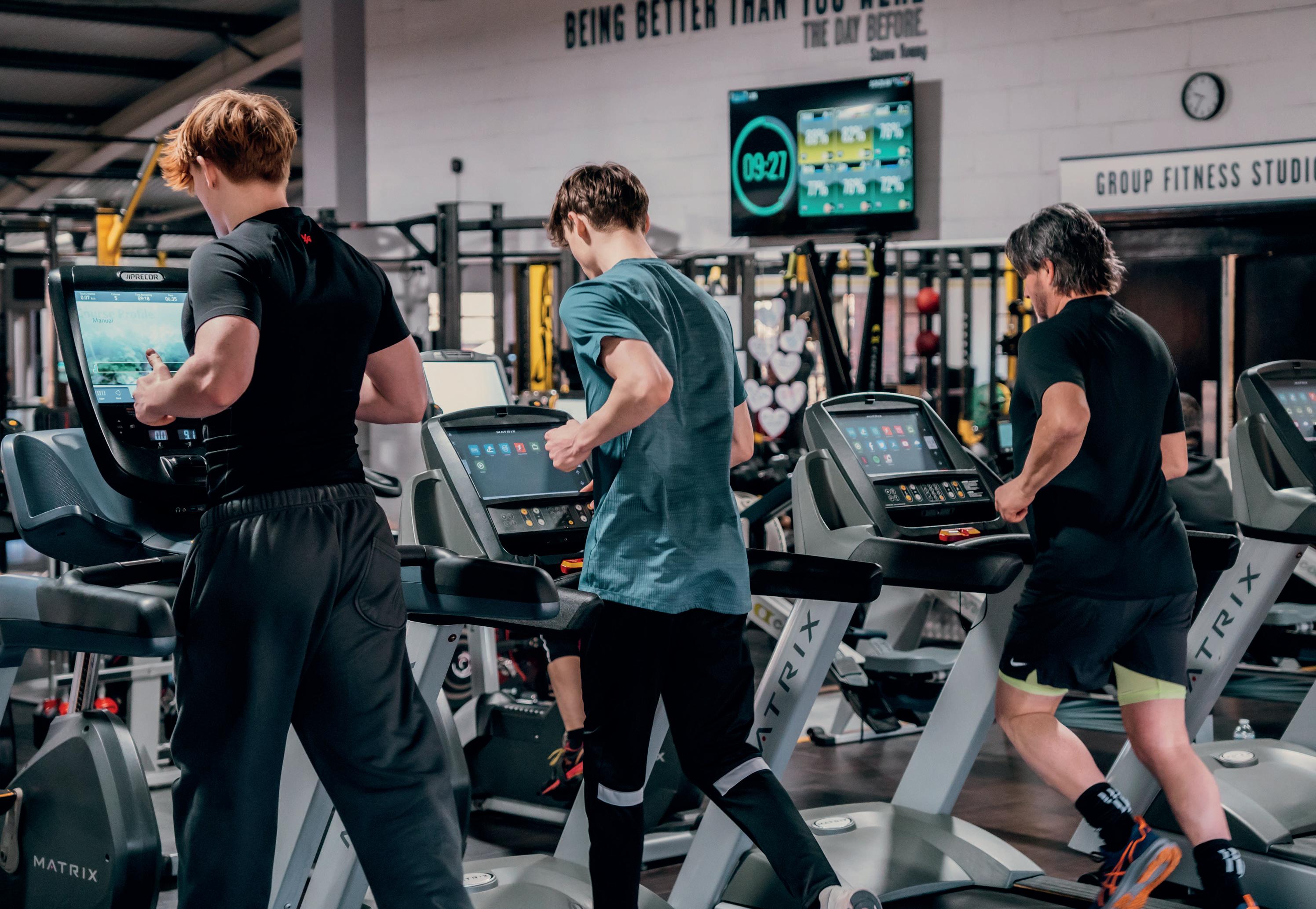
The club offers a staggered membership structure to make the price point of joining more accessible for all
"Our targets are not just financial; they include impacting community wellbeing and supporting local health strategies"
But we have a unique partnership with St Peter’s NHS Trust that has grown exponentially since 2018 and is far greater than just a GP referral programme. The St Peter’s MSK and Pelvic Health team now operates at the club five days a week, utilising our pool, studios, gym, function space, and the five clinic rooms with a waiting area that was once our beauty space.
I can’t tell you how fantastic it is to walk around the club and see NHS staff working with patients, having lunch in our café and working in partnership with my team. Patients coming for treatment find it much more relaxing in our club than a clinical hospital environment; it also gets them comfortable with the club. When they finish their four to six weeks of treatment with the NHS, they already have familiarity with the club, and are likely to join to continue their rehabilitation or get referred onto our GP referral programme.
Could you give us a flavour of the initiatives you work on with the NHS and Runnymede Borough Council?
As with many areas around the country, a significant focus – and part of our the council’s leisure strategy – is keeping the 65+ age group active. We have 464 members on our Prime Time membership that specifically supports this group with our prime time programme. Prime Time members receive a discounted membership and we run a specific class timetable for them that focuses on balance, strength and flexibility. This is all supported by our Prime Time coordinator Avril. We also run OTAGO fall prevention classes twice a week, which focus on supporting people with poor balance and coordination and at risk of falls. You don’t need to be a member to access the class. The aim is to improve the quality of
their life and keep their independence. After the classes the participants all come to the café and receive a discounted hot drink as the social element is extremely important for this age group.
In addition, Avril, our Prime Time coordinator, has been carrying out visits to local care homes – in partnership with Runnymede Council – to run chair and fall prevention classes. This was only a short term project but it would be great to be able to continue this as the benefit to the residents would be huge.
Then there is our Milon circuit, which we use as a pathway for those on GP referrals, Prime Time and OTAGO members, to use the club. The circuit is on the main gym floor and not tucked away in another room, as we want the users to get comfortable with the gym environment to make the progression into other areas less intimidating.
As a result of your wide range of services, you must have a really diverse customer base? Yes, our facilities and services mean we do attract a wide range of customers. The mornings and up to 1pm is the main usage time for our Prime Time/ GP Referral members and our new mums and baby swim lessons. The afternoons attract junior members and children for swimming lessons and dance clubs. From 5pm all the people who have been working start coming in. So, throughout the day, you will see a variety of ages from babies to 90-year-olds.
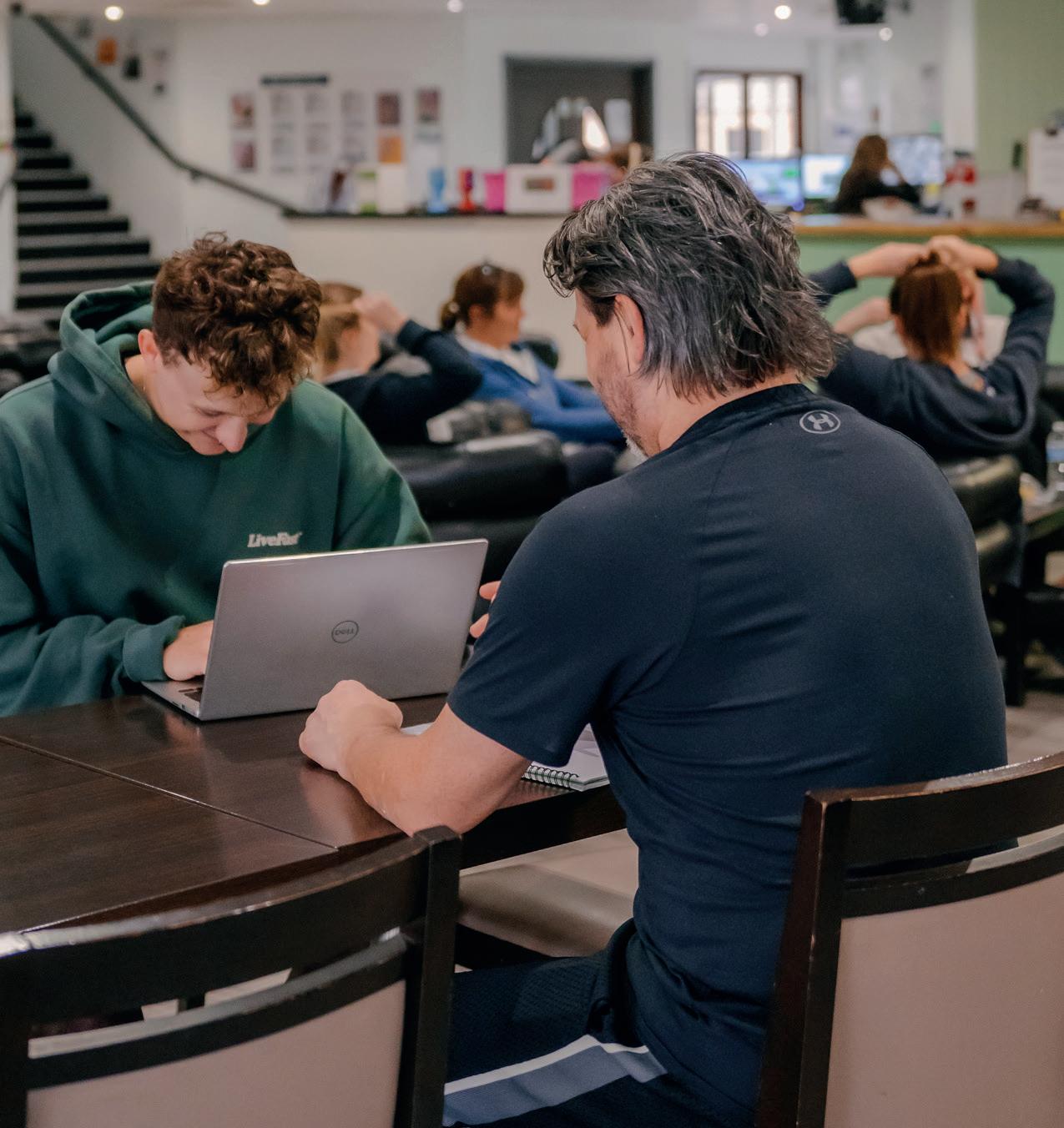

In addition to those with the NHS and the council, what other partnerships does River Bourne Club utilise in its programming and operations?
We partner with Hussle and Class Pass, which help us extend our reach to people we may not normally reach with our marketing, driving in income and new sales. We also offer Myzone tech, which is part of our member engagement strategy to help keep members focused and motivated Hydrohex has been a partner of ours for over a year and our most successful venture with virtual classes. The aqua crowd are a tough group to please – but the feedback from members on the quality of the classes has been very positive. Meanwhile, Proinsight is our mystery shopping partner and helps us make sure our customer experience and new member services are on point, and helps direct areas training or development may be needed.
On the equipment side of things, we work with a number of suppliers – such as PSLT, Inspace, Watt Bike, Milon and Matrix. When it comes to equipment we want it to be easy to use and effective. We also want to work with suppliers who can minimise downtime, so service is critical when picking our suppliers.
What are your main focus areas at the moment?
We’ve been thinking about what our members need and, although we’re experts in fitness and motivation, we’re not necessarily experts in nutrition,

The club currently has 187 members on its GP referral programme
"We partner with the NHS to create a welcoming environment where patients can transition into long-term wellness."
medical advice or mental health. We reviewed our memberships and in March 2025 we relaunched our new membership offerings with a new headline Wellness membership. Through a partnership with Health Hero, the Wellness membership will include access to GPs, dietitians and mental health coaches, as well as a wellness app for further support.
I want to double down on our programming that can better support elements of our community that may not necessarily be able to access our facilities –or lack the confidence to do so. For various reasons elements of the community struggle to access leisure facilities due to financial, physical mobility issues or because of public transport restrictions.
We also have big ambitions to grow our swim school to 800 students this year and my swim manager has spent the last 12 months putting the foundations in place to support that growth.
And what about your future plans – any plans to expand services or add to the facilities?
One of our sayings is that we are a “club without walls”. What that means is that we won’t limit ourselves to only what we can do within the physical confines of the club. For example, over the last couple of years, we’ve run holiday activities and food (HAF) programmes at a local school and recently considered taking over the tennis coaching on the courts in local parks.
We also have a number of ideas on how we can better support the 65+ market at home and in local community halls through virtual and instructor-led classes. The idea is to help people who may struggle to leave their homes to build a level of ability to be more active and mobile. If we can help them leave their homes, they can then be involved in more activities to gain further improvement and avoid being socially isolated.
David Turner, who owns River Bourne Club with his brother, Aron, has been at the forefront of the physical activity industry for nearly 50 years.
Turner has launched, invested in and operated a wide range of companies, from indoor football centres and health clubs to wearable fitness technology firms. In June 2022 he also acquired The Leisure Database Company –the sector’s leading data analyst and insight firm. WellNation spoke to Turner about his journey.

“We made it profitable, relabelled all the other clubs LA Fitness and it did very well.
We built the portfolio from the three original clubs to more than 70 clubs in the UK, Ireland and Spain with over 2,000 employees. We floated on the main London Stock Exchange in 1999 and, eventually, sold the company to MidOcean Partners in 2005.”
A qualified surveyor, Turner worked in the property sector and as a town planner prior to opening his first club in 1979. Called City Squash, the facility was groundbreaking as it offered both squash courts and a gym. Turner’s concept – of offering racquet sports alongside a separate, full-service health club – has since become popular across the world.
In the early 1990s, Turner’s vision and eye for emerging trends led him to setting up the iconic LA Fitness brand in the UK, alongside business partners and fellow industry legends, Fred Turok and Jeremy Taylor. Turner says the origin story of the brand was a slightly unusual one.
“In 1993 Princess Diana was illegally photographed in a health club in Isleworth called LA Fitness,” he says. ”The owner, as we know, caused a lot of controversy and troubles for the club.
“At that time I was working with my two partners Jeremy Taylor and Fred Turok. We already had three clubs – including one in Victoria – and had just signed two further leases in Golders Green and Bromley. We were looking for a name to brand them all together and, when we heard that the LA Fitness club was struggling, we bought it as we liked the name.
Following the sale of the LA Fitness business, Turner set up an investment vehicle to capitalise on new opportunities in the sector. The intention was to use the company – called ADDLeisure – to identify ventures that had the potential to grow and invest in them.
“When I left LA Fitness following the sale to MidOcean Partners, I felt there were things that the physical activity and fitness industry hadn’t really developed yet – areas which had huge potential,” Turner recalls. “For example, I thought we were short on technology in the sector, which I still feel even now.
“While fitness technology is now on a completely different level, I think that there’s still room for a much more joined-up approach.”
Turner then partnered with Alan Fisher, the founder of fitness chain Holmes Place, who had similar views on the sector as Turner did. The pair also brought in wearable tech entrepreneurs Paul Landau and Ben Margolis. Together, they pioneered FitBug, which was a wearable pedometer and tracker that allowed the recording and downloading of data. The data could then be used to help manage people’s activities. It was ahead of its time and had real potential and Turner and his team worked with some big organisations, including BUPA and Pru Health.
“FitBug was brilliant,” Turner says. “But then something called Fitbit emerged in Silicon Valley and took most of what we were doing.

They had the resources and tools to build their chip technology into a US$3.5bn business.
“Meanwhile, because our investment was mainly UK-based and probably lacked the imagination they had in Silicon Valley, we never really reached the same size. But while we didn’t reach the heights that Fitbit did, I feel that I was definitely vindicated in my view regarding the possibilities – and potential – of wearable and tracking technologies.”
Data is king
Having spent 50 years in the sector, Turner remains very much involved in the industry – and is still keen to identify new opportunities and pioneer change. Through his ownership of River Bourne Club, he is reshaping the relationship that a private health club can have with its surrounding community.
ADDLeisure’s acquisition of The Leisure Database Company is also a result of Turner
identifying a potential growth area.
“LeisureDB is one of the most trusted names in the industry,” he says. “It is the goto when it comes to data, because it has been collecting data consistently for 20 years.
“Having invested in it and, as its chair, we are planning for the company’s future. The reports we are working on are industry leading and it is now up to us to deliver our plans for the next five to 10 years. Let’s face it - the world seems to change every 5-10 years, rather than every 100-200 years, like it used to. So we’re now looking to develop new products to get to the next stage.
“The work LeisureDB does will evolve and we will work in partnership with people and organisations. The physical activity industry is looking to establish itself as part of a preventative healthcare system, so we’re also looking to supplement the data of what is going on in the industry with what is going on with the people. It’s a piece of work which we are looking at now.”
Fitness equipment giant, Freemotion, is going the extra yard to help the US’s top skiers and snowboarders hit the slopes with con��dence – while also providing top quality training content for athletes everywhere
In late 2023, Freemotion’s parent company, global fitness tech giant iFIT, inked a partnership with the U.S. Ski & Snowboard (the national governing body for Olympic and Paralympic skiing and snowboarding). The project included a complete re-design of the USANA Center of Excellence’s gym in Park City, Utah, with new Freemotion cardio and strength equipment, as well as select NordicTrack cardio machines, for nearly 250 elite athletes and staff.
“This partnership is a natural fit because both iFIT and U.S. Ski & Snowboard are deeply committed to excellence, innovation and the progression of athletic performance,” said Mark Watterson, iFIT Commercial CEO. “For iFIT, this collaboration aligns with our purpose to serve athletes of all levels and abilities by providing them with cutting-edge cardio and strength equipment and immersive training experiences.”
The physical remodel
The Freemotion makeover at the gym – housed inside the 85,000sq ft Centre of Excellence building – began with adding state-of-the-art equipment such as the Incline Trainer and Reflex treadmills, Freemotion Glute-Ham Developers for lower body strength and more. The Dual Cable Cross, a favorite among the trainers, was also added to facilitate strength and mobility exercises.


“The Freemotion Dual Cable Cross is a standout piece in this retrofit,” said Watterson. “Its versatility allows athletes to perform a wide range of functional, multi-plane movements, making it ideal for strength, stability and power training. The ability to adjust resistance and specific positioning ensures athletes can customise their workouts to target specific muscle groups relevant to skiing and snowboarding.”
The Incline Trainer represented another new supplement to the floor, which permits cardio training while simulating mountain-like conditions.


New cardio bikes were installed as well as infused with engaging and informative visual content.
“I utilise the Freemotion bikes with athletes the most out of all the cardio equipment because the screens allow me to see their power output as well as their RPM, and their distance,” said Maddison Beck, Athletic Development Coordinator at U.S. Ski & Snowboard. “I can individualise each athlete’s program while allowing them to have that individual feedback.”
“These additions are particularly exciting because they cater to the specialised needs of elite athletes
preparing for world-class competition,” Watterson said.
Freemotion also dropped in several of its versatile FitRigs during the remodel. Users can go from squatting to core-strengthening leg raises to simple pull-ups in a matter of seconds with the equipment. Foreste Peterson, the Athletic Development Coordinator at U.S. Ski & Snowboard, went as far as to call it the “one stop shop.”
“You literally can do everything there,” Peterson went on. “You can do any kind of lower body exercise, such as lunges, and then go right into a core exercise. You can target your whole body.”

iFIT also recently introduced its Train for the Slopes workout series as part of the partnership. iFIT Trainers Knox Robinson and Shannon Cooper collaborated with professional snowboarder, Lindsey Jacobellis, and alpine skier, Ryan Cochran-Siegle, to assist athletes in their training both from a physical and mental perspective.
In the content series, the four experts lead individuals through cardio, flexibility, balance and HIIT workouts to prepare for their trips up and down the mountain. Tricks and tips from years of experience are made available throughout the series as well.
Both U.S. Ski & Snowboard and Freemotion have benefited from the partnership thus far through new events and collaborations. As competitions have taken off for the season, seeing the athletes perform at their peak and bringing their expertise to the wider iFIT platform for the masses to enjoy has been equally pleasing.
“The equipment that Freemotion produces matches our desire to push the boundaries to help our athletes get fitter, stronger and faster,” said Sophie Goldschmidt, President & CEO, U.S. Ski &
Snowboard. “We love this relationship with Freemotion where we fully outfitted the gym with all the new equipment. There was a lot of excitement both from our high performance experts, doctors and medical practitioners. It’s really revolutionised this center.”
iFIT understands that the difference between a stuck landing and a wipeout or the between gold, silver and bronze, is sometimes made in the gym rather than on the mountain.
“By modernising the gym with state-of-the-art Freemotion cardio and strength equipment, we’re providing tools that not only enhance physical preparation but also ensure efficient recovery and injury prevention,” said Watterson. “Cutting-edge equipment isn’t just a luxury — it’s a necessity to keep athletes competitive and ensure they’re operating at their peak.”
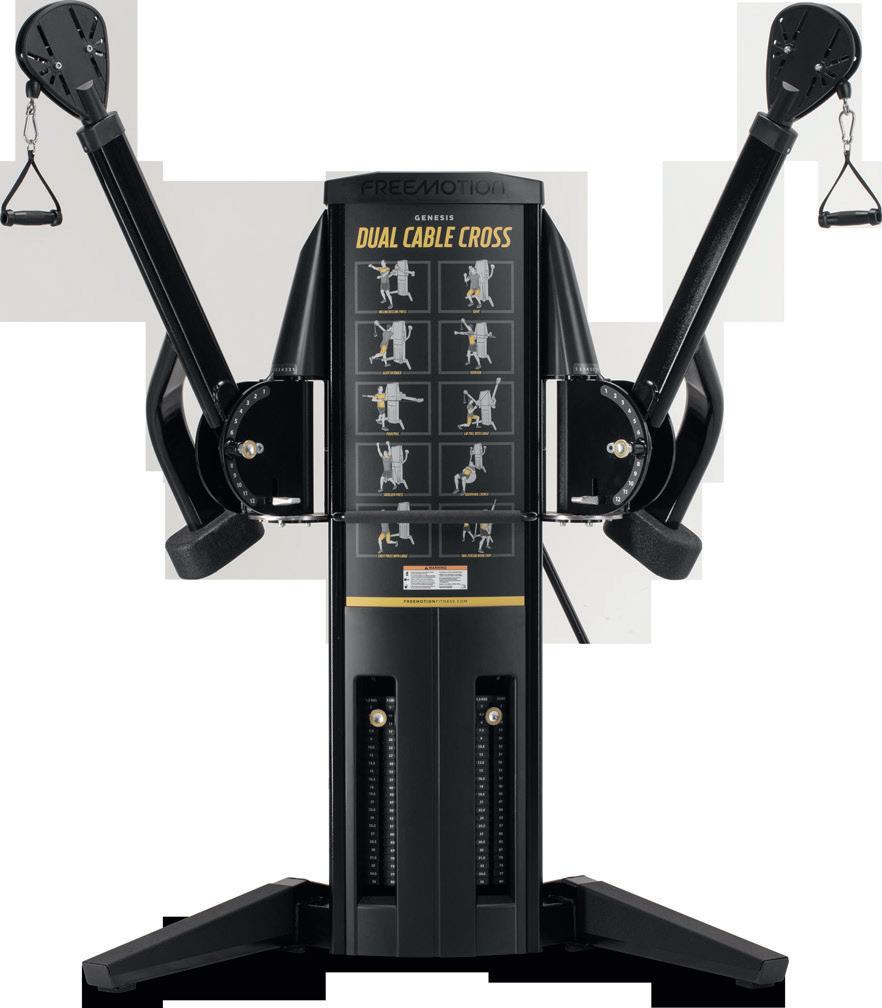

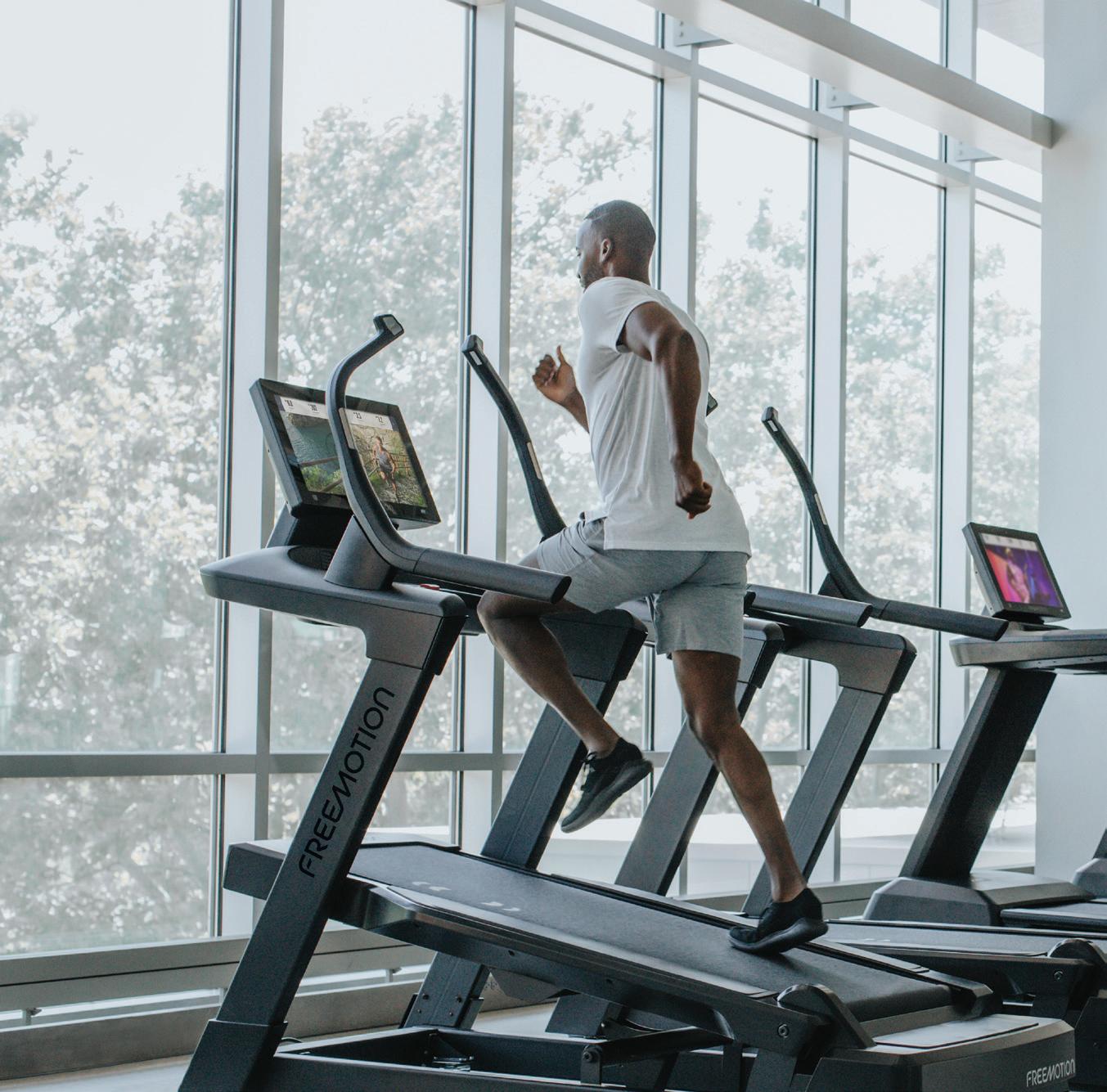

We can answer these questions and more.
As the leisure industry’s leading source of market intelligence, we do the hard work of data collection to enhance insights and inspire growth across every sector and every business – including yours. With options to suit a variety of budgets, our bespoke Market Intelligence Service is the industry’s best-kept secret. So, how can we help you? jamie@leisuredb.com